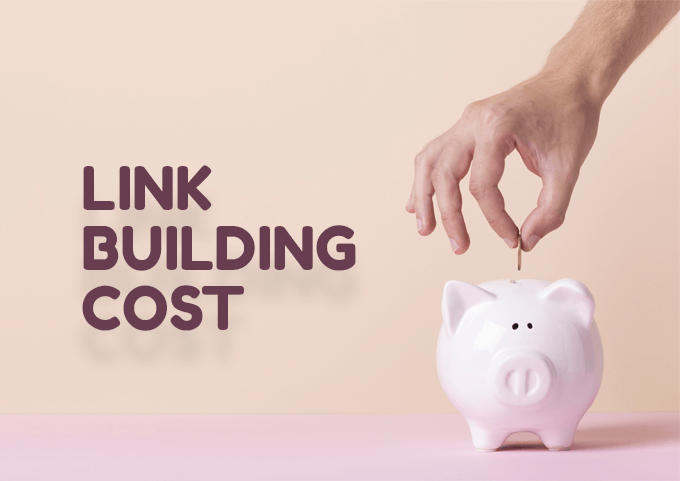
Digital marketing can be a mystery if you’ve never had any formal or informal education about it. And if you go online, it’s hard to weed out truly actionable advice in a sea of self-promotional gurus peddling courses. One area that is particularly challenging is SEO.
Even the most basic of SEO courses will tell you that there is no success without backlinks and that building links is a must for ruling the first page of Google. And if you don’t know how to build links yourself, you’re probably wondering if you can delegate it to someone else.
But how much does link building cost?
Today, we’ll explore the cost of link building. In this article, we’ll cover how to calculate the ROI of link building, the total costs of link building, and what to consider when outsourcing or building an in-house link building team.
Let’s jump in!
Why Link Building Matters
You may be wondering if building links is something that you should spend time and marketing budget on. Rightfully so.
While Google’s algorithms keep changing and the requirements for ranking well are different with each month, one thing remains constant. Having lots of high-quality backlinks to a page is necessary if you want that page to rank anywhere close to the first page of Google.
Sure, there are other signals and metrics, starting with the quality of your content, the loading page speed, the formatting, the sitemap, and many others. However, links have an immense impact on your SEO performance and they’re still one of the strongest ranking factors.
Over the years, many Google employees (such as Andrey Lipattsev) have stated that links are one of the top 3 search ranking factors.
Simply, the more high-quality links you have, the easier it will be for you to rank and the more organic traffic you’ll get from search engines such as Google – provided you have quality content.
For example, we have a SaaS client that spends $100,000/month on SEO and competes with some of the biggest companies in the world. Of that budget, 30% is spent on link building. If you want to rank for competitive keywords that drive revenue, you have to invest in link building.
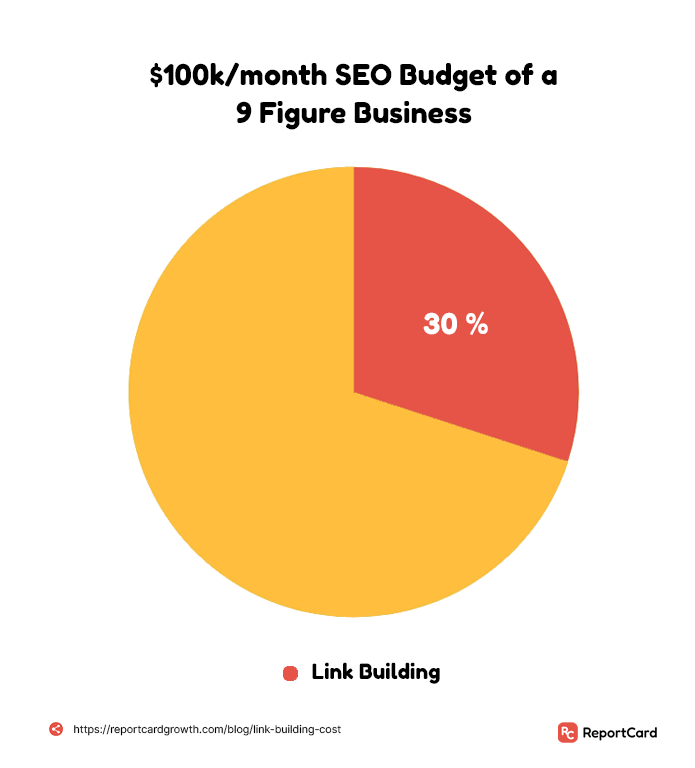
You may be wondering if buying links is against Google’s best practices, but the truth is that every good link will cost money.
Link building costs money either in the form of paying for links on websites, or the time it takes for your team to do outreach, write guest posts and secure backlinks.
In this article we’re going to talk about link building costs excluding any link payments you might make in addition to paying for the labor to do it.
What’s the ROI of link building?
Before understanding what your link budget should be, it’s important to understand what kind of link building ROI can you expect. After all, you want to make sure that investing in high authority links makes an impact on your bottom line.
Before calculating the ROI of your link building efforts, you need to take a few factors into consideration:
- What’s your customer lifetime value (LTV)?
- How much potential traffic can you get from a keyword that you’re writing for?
- How many backlinks are estimated to rank for that keyword in the top 10 search results?
- What kind of conversion rate can you expect from ranking well for that keyword?
Let’s cover each of these in detail.
1. Find Your Customer LTV
If you want to know how much you can spend to acquire a customer, you must first know what your customer lifetime value (LTV) is. This is how much the typical customer spends over their entire lifetime with you, not just their first purchase. For example, if a customer spends $100/month and they typically last two years, then your customer LTV would equal $2,400.
Once you calculate the average cost of building links, you want to make sure that your cost of acquiring a customer from SEO is lower than their lifetime value.
2. Find Your Traffic Estimates
If you have a piece of content written around a certain keyword, for example ‘lead generation tools’, and you want it to rank well, you’ll need to build backlinks to that piece of content.
Before doing anything, you want to know how much extra traffic you can get by ranking on the first page for the keyword, rather than page 5.
In other words, how many more people will come to your blog page through search engine rankings if you build links to it.
You can’t and don’t have to wing this. SEO tools such as Ahrefs can show you estimates on how many people search for a given keyword every month.

From the screenshot above, you can see that this ‘lead generation tools’ has 900 searches per month in the United States and almost 5,000 searches globally. Considering additional keywords an article on the topic of ‘lead generation tools’ would also rank for, Ahrefs estimates you could get 1,800 visitors a month if you rank well.
3. Determine the Number of Backlinks Required to Rank in SERPs
How many backlinks does it take to move a piece of content to page 1 on Google? Ahrefs gives estimates on the number of backlinks required to rank in the top 10 for that keyword:

For this specific keyword, it’s going to take approximately 77 backlinks to rank in the top 10, provided that the quality of content is great and that your technical SEO is in order. However, you can rank with fewer backlinks and Ahrefs’ figure is mainly an estimate.
Also in Ahrefs, you can take a look at the competitors for a keyword and find out how strong their Domain Rating (DR) is and how many backlinks their pages each have. A higher DR will make it easier for that website to rank with less backlinks.
Ahrefs allows you to click into Backlinks and see if they’re good quality or spammy links. Moreover, you can determine the type of link building they used to achieve these results.

4. Determine Your Conversion Rates
The ultimate goal of most content is to lead to more sales or whatever other type of conversion you may have in mind. Booking a demo, subscribing to your newsletter, getting a free trial or something else.
However, not all content can convert the same number of visitors to customers. Depending on the stage of the sales funnel (top, middle or bottom), they will have different conversion rates.If you don’t know this information, you can look at some industry benchmarks.
The average conversion rate across industries is around 2%, but it’s a good rule of thumb to assume a 1-5% conversion rate from the pages you want to rank. This is the last piece of information you need for calculating the ROI of building links.
5. Calculate Your Estimated ROI
With all this information at hand, you can calculate the return on investment from link building.
This is what the formula looks like:
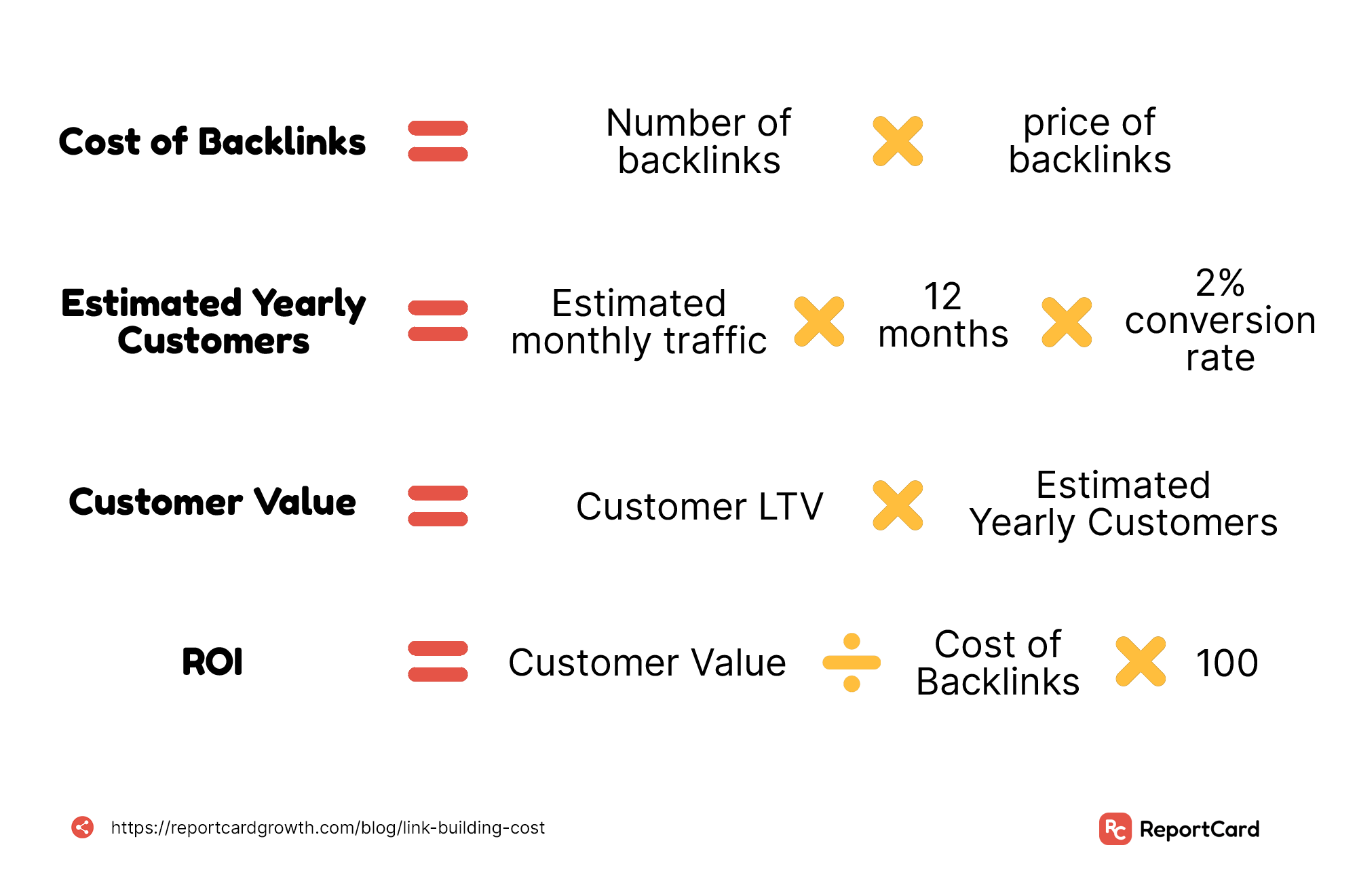
So from the examples above, you can calculate the Cost of Backlinks: 77 backlinks * $250 per link, equals $19,250.
With an estimated 1,800 visitors per month, 12 months of traffic, and an average 2% conversion rate, ranking for ‘lead generation tools’ might bring us 432 Estimated Yearly Customers.
With an LTV of $2,400 * 432 customers, our Customer Value would equal $1,036,800.
The total ROI is $1,036,800 customer value / $19,250 cost of backlinks * 100. This is a 5,385% return on link building.
Using this example, it looks like there would be a strong ROI if you invested in SEO for this keyword.
If you don’t know your conversion numbers, you can replicate this process to model some different scenarios to get the ROI of building links.
Over time, the more quality backlinks your website has, the easier it should be to rank any page you create and SEO should become one of your cheapest channels in terms of customer acquisition costs.
In-house vs. Outsourced Link Building
You should have a clearer idea about the value of backlinks at this point. Now you want to determine how to build links, and there are two common options: outsourcing to a link building agency offering link building packages or build links in-house.
Both have their pros and cons, so let’s look at each in detail so you can determine which option suits your business better.
In-house Link Building Cost
To understand how much it costs to build links in-house, we need to look at three separate periods of time in creating a link building team.
The hiring period, the training period, and the post-training period.
Here is a summary of the expenses you can expect and the cost per link based on our experience when building backlink teams.
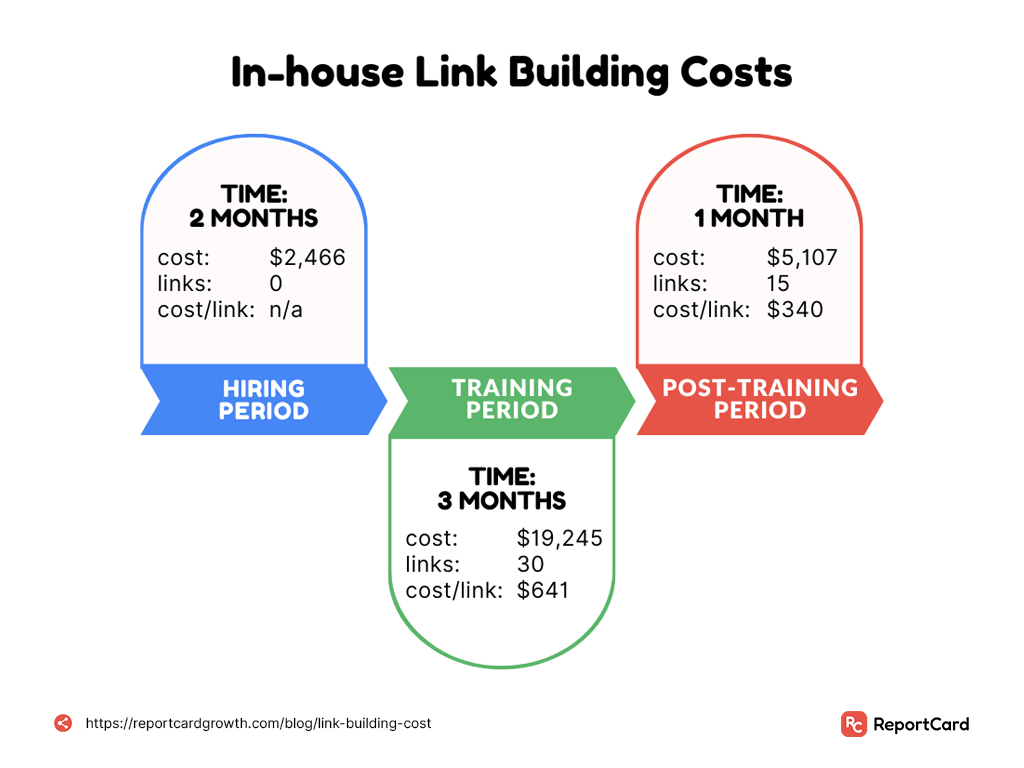
1 This does not include any paid link fees. If you pay websites a fee for links, Ahrefs estimates niche edit fees to cost on average an additional $360/link.
2 This assumes you can find a part-time link building manager to manage your link builder(s).
Now let’s dive into how we arrived at those numbers.
The Hiring Period
The hiring period is a 1-2 month time period it takes to source, interview and hire new link builders. Depending on how much experience you have with digital marketing and SEO specifically, it can take you more or less time than this.
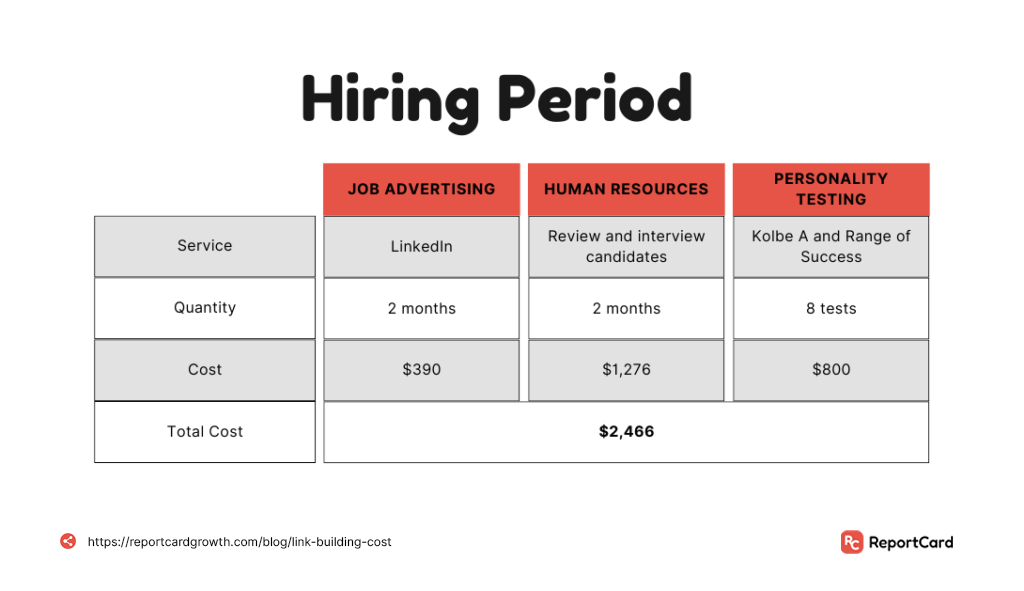
We’ll get into some more details in a bit.
Job Advertising
Our hiring ratio is about 1 out of every 100-200 applicants for link building positions.

To get that many applicants for a link building position, you’re going to need a service that will help promote your job post to make a great hire. There are many comparable services you can use to source applicants like LinkedIn, Indeed, etc. However, for this example, we used LinkedIn.
LinkedIn uses a pay-per-click (PPC) model to get applicants for your openings. We typically receive about 100 applicants a month for our job postings, but PPC costs will vary depending on the region. We arrived at $390 in LinkedIn advertising costs by using a budget of $6.50/day for two months.
Human Resources
Someone needs to review those 100 monthly candidates. This includes reviewing their resumes, job application responses, their writing samples, and their link building tests. Based on our experience, this takes about 10 hours a month.
We usually have about eight candidates that make it past this step and go to interviews. Our first interview is to understand job fit based on their experience and job history. The second interview is to figure out how good of a culture fit they are. Based on our experience, this takes another 10 hours a month.
For the candidates that make it past those interviews, we do reference checks, which take about 2 hours a month.
So in total, you or an HR person averaging $29/hour, will spend about 22 hours a month in the hiring process. In two months, that equates to $1,276 in human resources costs.
Personality Testing
After reference checks, we use a personality test called Kolbe to understand if a candidate’s natural way of working fits well with the requirements of a job. There are many personality tests out there and we think that when it comes to the pricing, they are all pretty similar.
To successfully use Kolbe, we start with buying a Kolbe Range of Success test, which is a one-time payment of $360. With this range, the link building manager answers some questions describing what they think someone needs to be successful.
Then you’ll pay $55/candidate for candidates to take a Kolbe A test. If you have 8 candidates who take this test, that’s $440.
So between the Kolbe A tests and the Range of Success, you will spend $800 on personality testing.
The Training Period
We’ve found the training period for an experienced link builder to train and get someone new up to speed takes 3 months. During this time you should expect about 30 links from your link builder.
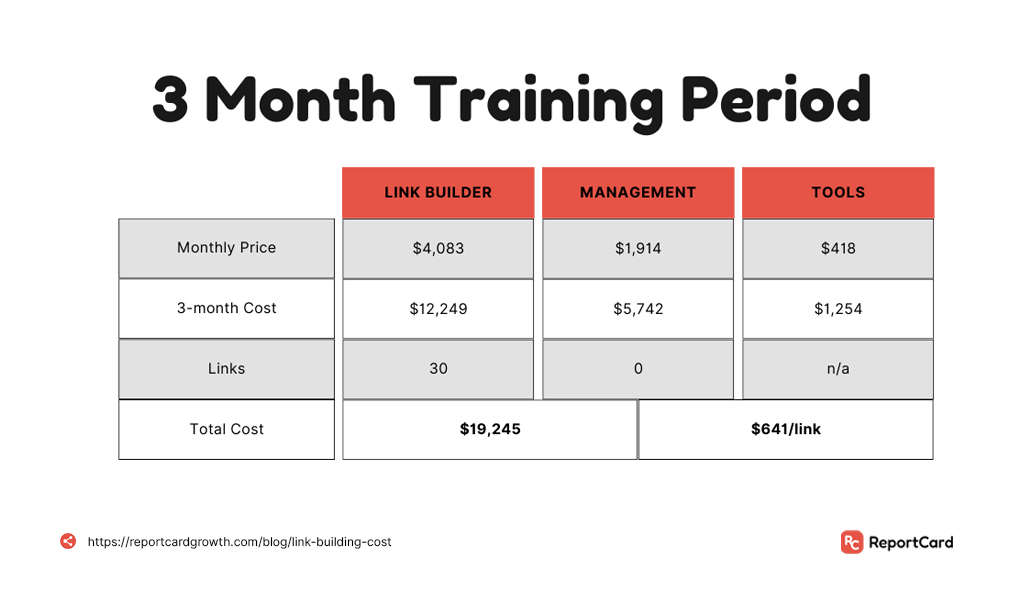
Glassdoor reports that an average link building specialist in the US earns $49,000/year. So during training, you will be paying the new link builder $4,083/month for 3 months.
In addition to paying the link builder, someone needs to train them. An experienced link builder with 4-6 years experience makes on average $58,245/year or $4,853/month, or $29/hour.
We estimate it takes about 3 hours/day for an experienced link builder to train someone new. With an average of 22 work days in a month and 3 months to ramp up, that equates to $1,914/month in management costs. This assumes you have someone on your team that can work part-time towards this training.
And finally, our link builders use Ahrefs ($199/month), Hunter ($49/month), and Clearscope ($170/month) to perform their job. That’s an additional $418/month in software tools.
That comes to a total of $19,245 and $641/link cost during the 3-month training period.
The Post-training Period
The post-training period is the period of time when a link builder should require minimal management and consistently generate about 15 links a month (depending on your link criteria).
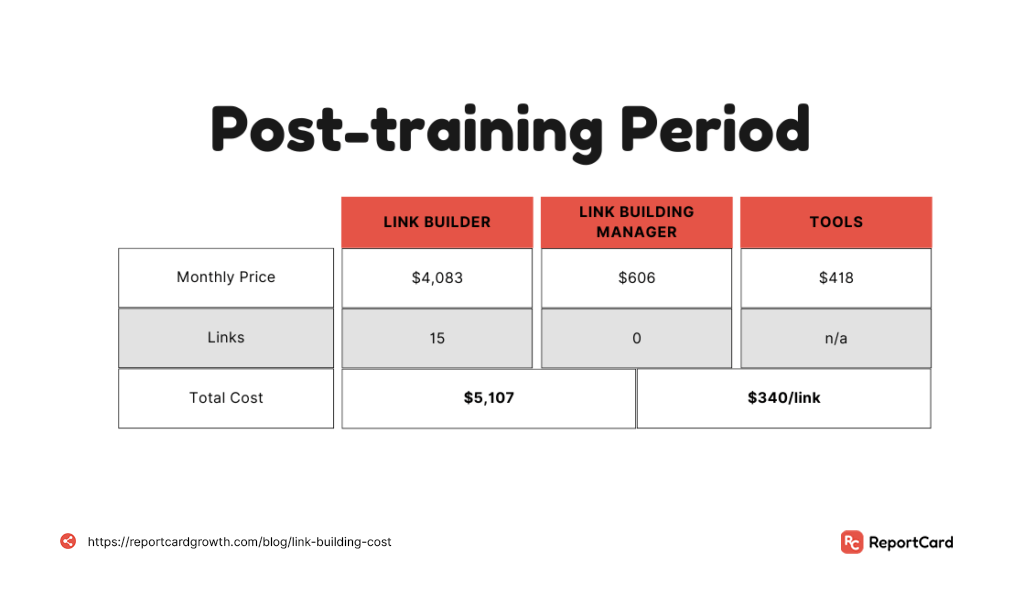
A link manager can manage up to 8 link builders. So dividing the average manager salary of $4,853 by 8, you get $606/month in cost. This again assumes you can hire a manager part-time or have that expertise on your team already.
With those assumptions, it might cost you $340/link in house after 3 months.
Outsourced Link Building Cost
Agencies have different sets of criteria for charging for links. Most agencies charge on a performance basis per link. With this model, you don’t have to pay for any of the hiring or training period, time spent writing guest posts, time spent on outreach, communication with bloggers, etc.
If an agency builds links for you, you know exactly what you’re paying. If they don’t build links for you, you pay nothing.
Outsourced link building pricing is generally based on:
- The domain rating or domain authority of the link (the strength of the website the link is coming from
- The relevance of the link (how related the website is to a client’s niche or industry)
- The traffic of the website/page the link is coming from
- And any other custom link criteria you want to add, which can make link building more difficult (and more expensive)
Our link building pricing at ReportCard starts at $125/link and goes up to $450/link on our link order plans, with minimal input on link criteria. On this plan, link costs average about $250/link.
For custom link building criteria, link building can take a lot more time. In this case you can expect rates to cost upwards of a thousand dollars for the most difficult links.
If you’re interested in custom link building campaigns, you can learn more about ReportCard’s offerings here.
What to Look For When Hiring An Outsourced Link Building Partner
If you’re thinking of hiring a marketing agency, be wary of those offering link building campaigns for low prices. Quality costs, especially in more competitive industries.
Last but not least, you want the ability to scale. A good agency can easily accommodate a larger number of links through a variety of link building tactics. ReportCard for example has built tens of thousands of links for our clients over the years.
In-house vs. Outsourced link building Cost: The Verdict
When it comes to the costs, it may seem like in-house has the upper hand here but that’s only on the surface. In reality, you’ll have to sink almost $2,500 into hiring a candidate. During the training period it could cost you $641/link. Then finally after a few months, you might get costs down to $340/link, but there are no guarantees.
With an outsourced agency link building model, you pay only for performance, with prices often being less than what you could spend in-house.
However, let’s get into some more specifics of the comparison and look beyond the cost.
In-House Link Building: Pros and Cons
Let’s wrap up the ins and outs of hiring an in-house link builder.
Pros
- More control: When you have an in-house team, you have more control over the link building strategies that are implemented. You can oversee the entire process and make changes as needed.
- Cost savings: In-house teams may be cost-effective in the long run as you do not need to pay an agency’s overheads or third-party fees.
- Customized approach: You can completely customize the approach and the link building strategies according to the requirements of your business.
Cons
- Higher costs initially: Building an in-house team requires higher initial costs, such as recruitment, salaries, benefits, and training.
- Limited expertise: An in-house team may have limited expertise in link building compared to professional link building services.
- Time-consuming: Building an in-house team is time-consuming, and the team members may not be able to dedicate all their time to link building, link prospecting, blogger outreach, content creation, and more.
- Resource allocation: In-house teams need to be provided with the necessary resources like tools, software, and technology to perform their jobs effectively.
- Career progression: In link building, people usually want career progression after a year on the job, at which point you must start this process all over again.
Outsourced Link Building: Pros and Cons
On the other hand, building links with the help of an agency partner has its pros and cons as well.
Pros
- Expertise: Link building agencies or freelancers specialize in the field of link building and have pre-existing relationships and expertise in the latest link building techniques and strategies.
- Time-saving: Outsourcing link building frees up internal resources and allows businesses to focus on their core competencies. You don’t have to spend hours catching up with webmasters, site owners and marketing managers.
- Cost-effective: Outsourcing link building can be more cost-effective than building an in-house team. Businesses do not need to invest in tools, training, or salaries and benefits for employees.
- Access to resources: Link building agencies or freelancers have access to a wide range of resources including tools, databases, and networks that are necessary for effective link building.
- Results-driven: Link building agencies or freelancers are results-driven and focus on achieving measurable results for their clients.
Cons
- Quality concerns: Businesses may have concerns about the quality of links generated by link building agencies or freelancers. They may also worry about the potential for the use of spammy or low-quality links.
- Control: Outsourcing link building may result in a loss of control over the link building process. Businesses may have less control over the types of links generated, the timing of the link building, and the overall strategy.
Wrapping up
Unless you have a very strong link building expertise on your team and are going to build a ton of links, we recommend you outsource your link building on a performance basis to a link building agency.
If you’re ready to join the ranks of businesses adding 6-7 figures to their revenue every month with the power of SEO, book a free call with us. We’ll meet all your link requirements and help you smash both your SEO and revenue goals this year.
Ready to start building great links? Check our pricing page to learn more about the costs of high-quality links today.



